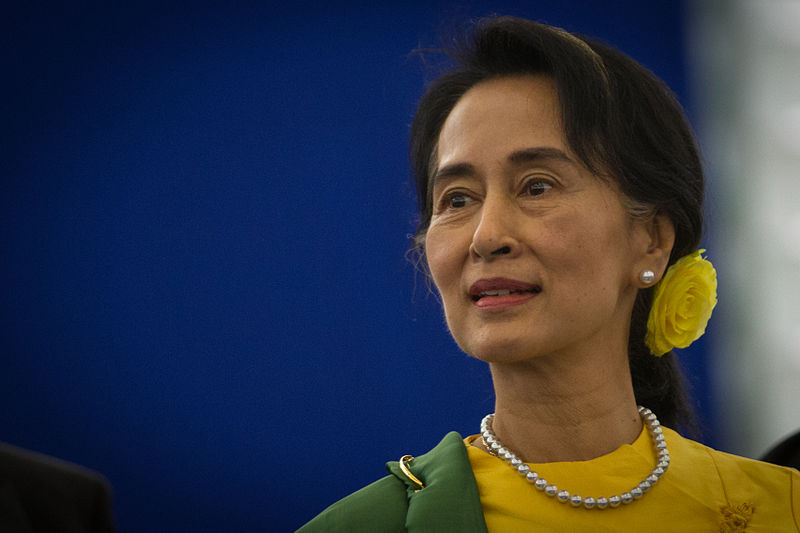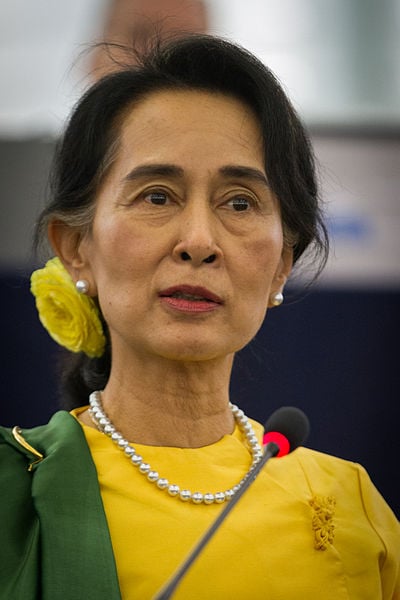Herstory: Ang Sang Suu Kyi, The Face Of Nonviolent Revolution In Burma
 Contributed by
Michaela Anchan
December 27, 2015
Contributed by
Michaela Anchan
December 27, 2015

Ang Sang Suu Kyi is one of the most important contemporary icons of democracy. She is an admirable and fearless woman who set aside everything to fight for the Burmese people’s freedom and human rights. She is an epitome of strength without the need for violence.
Ang San Suu Kyi was born in Rangoon on June 19, 1945, one of three children. Aung San, her father, was the founder of the modern Burmese army and the man who sought to liberate Burma from the British Empire. He was assassinated by his enemies two years later.
In 1960, Ang Sang Suu Kyi went to India to live with her mother, graduating with a political degree in New Delhi. Her further education was obtained at Oxford, where she was awarded her BA in Philosophy, Politics and Economics in 1969. Soon after, she moved to New York and worked for three years at the UN, focusing on budget matters. In 1972, she married Dr. Michael Aris. They had two sons together, Alexander and Kim, and lived between the US, England and India during the 70’s and 80’s.
Suu Kyi returned to Burma in 1988 in order to take care of her dying mother. The political situation in Burma at this time saw the resignation of the Burmese dictator U Ne Win. He left the country to be led by a military junta, but was still active in orchestrating violent acts against those who had continued to protest against him. At this time, Burma was renamed as the Union of Myanmar.

Suu Kyi, in particular, became very vocal against U Ne Win. In August 1988, she spoke in front of 500,000 people at a rally in front of the capital’s Shwedagon Pagoda, appealing for a much-needed democratic government. This had caught the junta’s attention and she was placed under house arrest in 1989. While she had the option to leave the country and be free, she insisted on staying and being part of the struggle. She was determined to see the junta free all political prisoners and return Burma to a civilian government.
Suu Kyi’s first house arrest ended in July 1995, and she remained busy for the next couple of years attending to the founding of the National League for Democracy (NLD) and working to become part of congress – still under military harassment. In 1998, she set up the representative committee and declared it to be the legitimate ruling body of the country; two years later in September 2000, she was placed under house arrest by the junta for this action.
Her second house arrest ended in May 2002, but a year later she was again placed on house arrest after the NLD clashed with some pro-government demonstrators in a street bout. From then on, her sentence was renewed yearly and even with the international community coming to her assistance each time, she was still not released.
In May 2009, Suu Kyi was due to be released but ended up being arrested again because of a violation of her house arrest terms when she allowed an intruder to stay two nights in her house.
The UN declared Suu Kyi’s detention to be illegal, based on Myanmar’s law, that same year. But despite this, Suu Kyi still went to trial and received a three-year prison sentence, which was later reduced to eighteen months. Many had believed that such ruling was only made to keep her from running in the upcoming multiparty parliamentary elections.
To show their support for Suu Kyi, the NLD disbanded as a result of their refusal to re-register their party. Because of this, there was no opposition on the government parties that ran and won most of the legislative seats, subsequently receiving fraud charges soon after. Six days after this election, Suu Kyi was again released from her house arrest.
During her two-decade long stay in Burma, Suu Kyi had to endure the pain of separation from her family – her husband and her two sons. It was a difficult decision she had made to put her country first and family second. Even more tragic was not being present when her husband Michael was diagnosed with prostate cancer in 1997 and died two years later. She rarely saw her sons during the period of her house arrests.
The NLD announced that they would re-register as a political party in November 2011, and two months later Suu Kyi formally registered to run for a parliament seat. After a long and exhausting campaign, they announced that Suu Kyi victoriously won a seat in April 2012. On May 2 of the same year, she took her oath as a member of parliament and assumed office.
Suu Kyi won several awards in recognition of her fight for peace and democracy. In 1990, she was the recipient of the Rafto prize and the Sakharov Prize for Freedom of Thought. In 1991, she was given the Nobel Prize for Peace, with her two sons accepting the award on her behalf. She used the 1.3 million dollar prize money to form a health and educational trust for the people of Myanmar.
The following two years she gained two more awards: the International Simon Bolivar Prize and the Jawaharlal Nehru Award, among other honors and accolades. She was awarded the Congressional Gold Medal in December 2007 by the US House of Representatives, following an impressive 400-0 voting. In May of 2008, then president George Bush had signed this vote into law, thus making Suu Kyi the first person to ever receive such a prize even while imprisoned.
Now at the age of 69, Ang Sang Suu Kyi is still very much involved in Myanmar politics as opposition leader in the present parliament. While there is still much to do in Myanmar’s journey towards full democracy, Ang Sang Suu Kyi has done more – and continues to do more than her part in a noble mission that benefits the people of Myanmar today and tomorrow.
Through it all, she has demonstrated the power and the ability to make a radical change even in the most unfortunate circumstances – the mark of a truly inspiring woman.
Visit Woolf Works page to find out more about the Coworking space.
Written by: Arlene Lagman
Arlene Lagman is the administration assistant of Woolf Works. She loves inspiring stories about natural beauty, self confidence, personal development, woman empowerment and happy endings. As a food enthusiast, traveler and writer, she always tries to find time for new experiences and adventures. |
This post was first published on Woolf Works blog and has been reposted on Executive Lifestyle with the permission of the author.
Image credits:
Other Resources about Ang Sang Suu Kyi
http://www.bbc.com/news/magazine-19667956
http://www.humanrights.com/voices-for-human-rights/daw-aung.html
http://www.biography.com/people/aung-san-suu-kyi-9192617#arrest-and-election
http://www.bbc.co.uk/news/world-asia-pacific-11685977
http://www.telegraph.co.uk/women/mother-tongue/9349279/The-pain-of-Aung-Sun-Suu-Kyis-sons-parted-from-their-mother-for-25-years.html
Image Credit:
Remise du Prix Sakharov à Aung San Suu Kyi par Martin Schultz au Parlement européen à Strasbourg le 22 octobre 2013 by Claude TRUONG-NGOC
Remise du Prix Sakharov à Aung San Suu Kyi par Martin Schultz au Parlement européen à Strasbourg le 22 octobre 2013 by Claude TRUONG-NGOC
Did you enjoy this post? Please comment, like and share!












Sorry, the comment form is closed at this time.